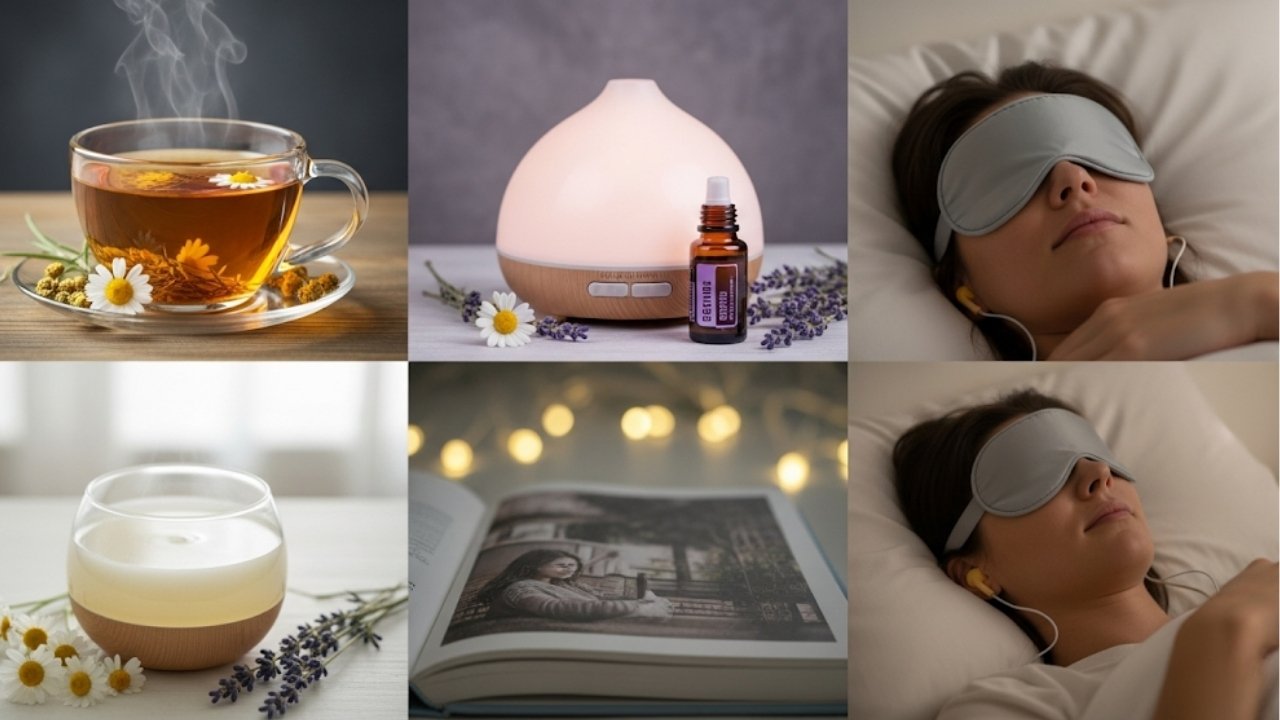10 Natural Sleep Aids for Better Night Rest

We’ve all been there. You crawl into bed, tired from the day, expecting to fall asleep in minutes. But then your mind starts racing. You replay conversations, plan tomorrow’s to-do list, and suddenly it’s 3 AM. Sound familiar? You’re not alone. Millions struggle with sleep every night, silently battling stress, noise, hormones, and more.
If you’re tired of counting sheep or relying on over-the-counter sleep meds with fuzzy mornings, this article is for you. Let’s dive into 10 natural sleep aids for better night rest that I’ve explored personally or through others’ experiences. These aren’t magic potions. But they work—gently, effectively, and without turning you into a zombie the next day.
1. Magnesium: The Calm Mineral You Never Knew You Needed
Magnesium is like that quiet friend who always has your back. It doesn’t shout for attention, but without it, everything feels off. I first discovered magnesium when I was going through a stressful time at work. I couldn’t sleep more than four hours a night. Someone suggested magnesium glycinate, and within a week, my sleep improved dramatically.
Magnesium helps regulate neurotransmitters and supports melatonin production—your body’s natural sleep hormone. It also calms the nervous system, which is crucial when your thoughts are doing laps around your brain.
Simple ways to get magnesium:
-
Eat spinach, almonds, pumpkin seeds, and dark chocolate.
-
Take a magnesium supplement (magnesium glycinate is gentle and well-absorbed).
-
Soak in a warm Epsom salt bath before bed.
Pro tip: Take magnesium about an hour before bed. You’ll feel the tension melt away.
2. Chamomile Tea: Grandma’s Gentle Sleep Secret
There’s something comforting about chamomile tea. It reminds me of my grandmother, who always brewed a cup for me during stressful finals week. Back then, I didn’t appreciate how powerful it was. Now, I see it differently.
Chamomile has mild sedative effects that come from a compound called apigenin. This binds to brain receptors and calms you down without making you groggy. It’s gentle enough for daily use and doesn’t interfere with your natural sleep cycles.
Why chamomile works:
-
Reduces anxiety and promotes relaxation.
-
Easy to include in a nightly routine.
-
Pairs well with honey and a book.
Drinking chamomile is like a hug in a cup. Try it 30–45 minutes before bed with soft lighting and no screens.
3. Valerian Root: Nature’s Sleepy-Time Pill
If you’ve ever looked into herbal sleep remedies, you’ve probably heard of valerian root. It’s been used since ancient times to calm nerves and help with insomnia. It smells a bit like old socks (not kidding), but don’t let that stop you.
I tried valerian during a period of jet lag. It didn’t knock me out instantly, but it helped me drift off in a way that felt natural and peaceful. Unlike sleeping pills, I didn’t feel hungover the next day.
Valerian root can:
-
Shorten the time it takes to fall asleep.
-
Improve sleep quality without side effects.
-
Be taken as capsules, tea, or tinctures.
Valerian works best after a few nights, so give it some time. It’s not a knockout punch—it’s more like a gentle nudge toward rest.
4. Lavender: A Scent That Soothes the Soul
Lavender is like a lullaby in plant form. I didn’t believe in aromatherapy until I started using lavender essential oil in a diffuser. After a week, I noticed I was falling asleep faster—and sleeping deeper.
Lavender doesn’t just smell nice. Research shows it can lower heart rate, reduce anxiety, and calm the mind. You don’t need to bathe in it. A few drops on your pillow or a dab behind your ears can do wonders.
Ways to use lavender:
-
Add essential oil to a diffuser.
-
Use lavender-scented lotion after a warm shower.
-
Sprinkle dried lavender inside your pillowcase.
This isn’t about luxury. It’s about creating a sleep ritual that feels sacred and serene.
5. Melatonin: Your Body’s Natural Sleep Timekeeper
Melatonin is the hormone your body produces to signal sleep. Darkness triggers its release, telling your brain it’s time to wind down. Sometimes, though, stress, screens, or jet lag can throw it off.
I use melatonin when I travel across time zones. It helps reset my sleep schedule without side effects—if I use the right dose. Many people take too much and end up feeling groggy. A small amount (0.5 to 3 mg) is usually enough.
Melatonin helps with:
-
Regulating circadian rhythm.
-
Falling asleep faster during changes in routine.
-
Reducing nighttime waking.
It’s not for long-term use, but it’s a great tool when used mindfully.
6. L-Theanine: The Zen Amino Acid
L-theanine is found in green tea. It promotes relaxation without sedation. If you’ve ever felt calm yet alert after sipping tea, L-theanine is likely the reason.
This amino acid increases alpha brain waves, which are linked to a relaxed mental state. I started using it during high-pressure deadlines. It helped me stay calm during the day and fall asleep easier at night.
Benefits of L-theanine:
-
Reduces anxiety and mental chatter.
-
Doesn’t make you drowsy.
-
Can be taken with magnesium for a double-calming effect.
Try 100–200 mg about an hour before bed. It’s subtle but powerful.
7. Glycine: The Tiny Amino Acid With Big Sleep Benefits
Glycine is another amino acid that doesn’t get much spotlight, but it deserves one. It helps lower your core body temperature, which your body naturally does before sleep. That cooling effect helps you fall asleep faster and improves sleep quality.
I stumbled across glycine while researching natural ways to sleep deeper. I now take it on nights I need extra help switching off. The dreams are vivid, and I wake up clear-headed.
Here’s how glycine helps:
-
Improves REM sleep.
-
Helps you wake up feeling refreshed.
-
Can be taken in powder or capsule form.
Take 3 grams about 30–60 minutes before bed. Mix it into water—it’s slightly sweet and easy to sip.
8. Warm Milk with Nutmeg: A Time-Tested Remedy
Yes, this sounds old-school. But warm milk really does work—and the secret lies in both tryptophan (an amino acid that promotes sleep) and nutmeg, which has mild sedative effects. This combo has been used in many cultures for centuries.
My mom used to give me this during thunderstorms when I was a kid. It helped calm my nerves and made me feel safe. As an adult, I rediscovered it after a stressful move. One mug, and I felt wrapped in comfort.
Why it works:
-
Tryptophan boosts melatonin production.
-
Nutmeg promotes muscle relaxation.
-
It’s a cozy, nourishing nighttime ritual.
Just don’t overdo the nutmeg—too much can cause side effects. A pinch is enough.
9. Tart Cherry Juice: A Surprising Natural Sleep Booster
Tart cherries aren’t just for pies. They’re one of the few natural sources of melatonin. Drinking tart cherry juice has been shown to increase sleep time and efficiency—especially in people with insomnia.
I tried it during a period of broken sleep, and to my surprise, it helped me stay asleep longer. I didn’t expect much from juice, but the science checks out.
Perks of tart cherry juice:
-
Rich in antioxidants and melatonin.
-
Helps with both falling and staying asleep.
-
Tastes great chilled or warm.
Drink 4–8 ounces about an hour before bed. Bonus: it’s good for joint pain, too.
10. Creating a Nightly Wind-Down Ritual
More than any supplement, the ritual of sleep can transform your nights. When you build a consistent routine, your body learns that it’s time to shift gears. It’s not just what you take—it’s what you do.
For me, this looks like:
-
Turning off screens 60 minutes before bed.
-
Stretching gently or practicing slow breathing.
-
Drinking herbal tea or taking magnesium.
-
Reading something light (no thrillers!).
Routines tell your brain, “It’s safe to let go now.” The more consistent you are, the stronger the signal becomes.
Quick Comparison Table: Natural Sleep Aids at a Glance
| Sleep Aid | Best For | How to Use | Onset Time |
|---|---|---|---|
| Magnesium | Stress & muscle tension | Supplements or bath salts | 1–2 weeks |
| Chamomile | Mild anxiety | Tea 30–60 mins before bed | Immediate |
| Valerian Root | Chronic insomnia | Tea or capsules | Few days to work |
| Lavender | Sensory relaxation | Diffuser, pillow spray | Immediate |
| Melatonin | Jet lag & circadian issues | Low-dose supplement | 20–30 minutes |
| L-Theanine | Mental calm | Capsule or tea | 30–60 minutes |
| Glycine | Sleep quality & temperature | Powder in water | 30 minutes |
| Warm Milk & Nutmeg | Emotional comfort | Drink before bed | 30 minutes |
| Tart Cherry Juice | Sleep duration | 4–8 oz before bed | 1–2 hours |
| Wind-Down Ritual | Habitual sleep issues | Daily consistency | Ongoing |
In Closing: Sleep Better, Live Brighter
Sleep is sacred. It’s the time your body repairs, your mind resets, and your soul breathes. If you’re struggling, know that you’re not broken. You just need to find what works for you. These 10 natural sleep aids are gentle allies—each offering a different kind of comfort.
Try one at a time. Mix and match. Experiment with what feels right. The goal isn’t perfection—it’s rest. True, nourishing rest.
So tonight, light a candle, sip some tea, and remind yourself: you deserve peace. Sleep is not a struggle. It’s your birthright.
